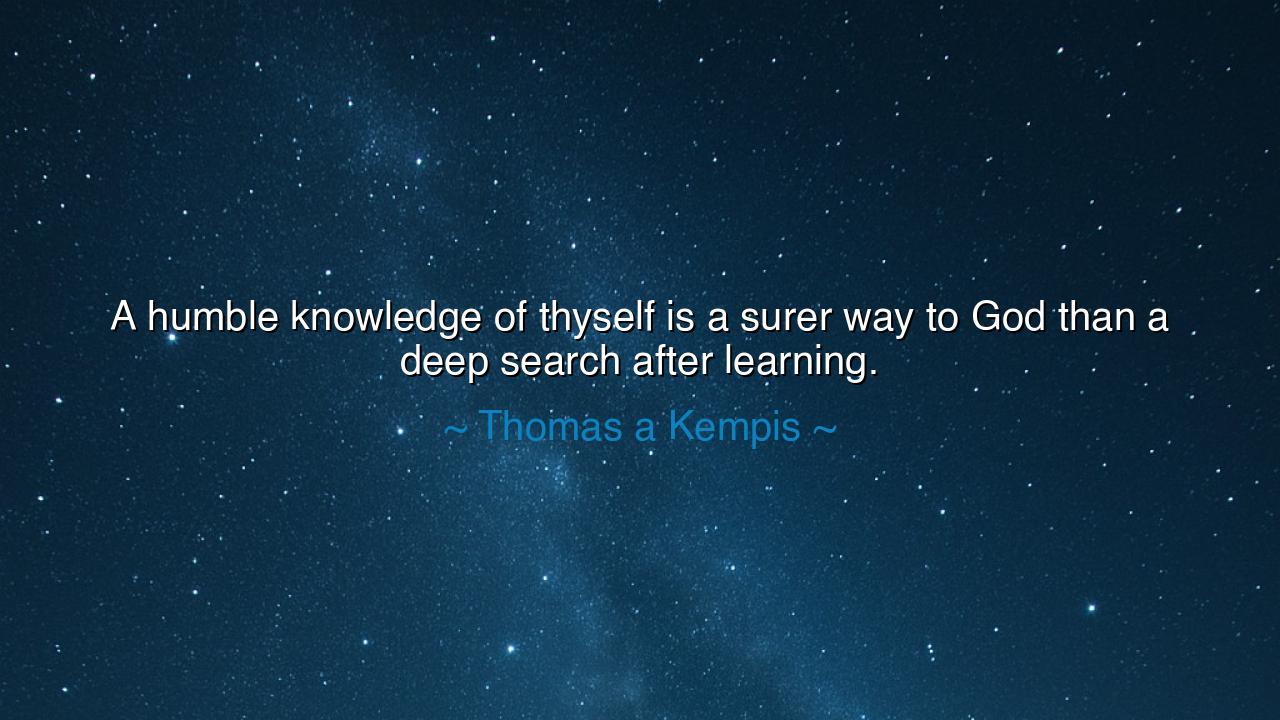
A humble knowledge of thyself is a surer way to God than a deep






“A humble knowledge of thyself is a surer way to God than a deep search after learning.” – Thomas à Kempis
In these serene and timeless words, Thomas à Kempis, the devout monk and author of The Imitation of Christ, reveals a truth that lies at the heart of all spiritual wisdom: that self-knowledge, grounded in humility, leads more surely to divine understanding than all the libraries of the world. His teaching pierces through the vanity of intellectual pride and calls the soul back to simplicity. He does not condemn learning, but warns that knowledge without humility becomes a veil rather than a window—a mountain of thought that hides, rather than reveals, the face of God. True wisdom, he reminds us, begins not in the mind, but in the heart that knows its own smallness before the Infinite.
The meaning of this quote lies in the sacred balance between knowing and being. Thomas teaches that the path to the Divine does not run solely through the intellect, but through the transformation of the soul. One may master the philosophies of men, read the words of prophets, and memorize sacred texts, yet remain far from God if one’s heart is filled with pride. But the one who knows his weakness, who sees his own faults clearly and bows before truth—such a person walks closer to heaven. Humility is the soil from which faith grows; without it, even knowledge becomes barren. The scholar may speak of God, but the humble man walks with Him.
The origin of this teaching can be traced to Thomas à Kempis’s life as a monk of the 15th century, living in quiet devotion at Mount St. Agnes in the Netherlands. He was part of the Devotio Moderna, a movement that sought to renew spiritual life through simplicity, inner reflection, and practical piety. Surrounded by scholars who debated theology in endless circles, Thomas turned instead toward the discipline of the heart. He saw how men of learning often became proud in their cleverness, mistaking knowledge of words for knowledge of truth. In The Imitation of Christ, he wrote not for the brilliant, but for the sincere—for those who sought to live as Christ lived: humbly, purely, and close to God. His words endure because they speak to all ages, reminding humanity that the greatest wisdom is not to know much, but to know oneself truly.
History provides many mirrors for this truth. Consider the life of Socrates, who, though not a Christian, understood the same eternal principle. When the Oracle at Delphi declared him the wisest of all men, Socrates answered that his wisdom lay in knowing that he knew nothing. This was not ignorance, but humility—a recognition of the vastness of truth and the smallness of the self. He did not seek to accumulate knowledge for power or prestige, but to purify the soul through questioning, honesty, and virtue. In his quiet acceptance of death rather than betrayal of conscience, he embodied what Thomas à Kempis would later teach: that inner integrity brings one nearer to the divine than all the philosophies of the earth.
We see this also in the life of Saint Francis of Assisi, who abandoned wealth and learning for the simplicity of poverty. In the eyes of the world, he became a fool; in the eyes of heaven, a saint. His humility became the light by which others saw God. While scholars debated doctrine, Francis knelt before lepers, seeing the face of Christ in their suffering. He did not speak of God in grand phrases—he lived God in silence. Thus, through the humble knowledge of himself—his weakness, his dependence, his love—he found a surer road to heaven than all the scholars of his age.
Thomas à Kempis’s words strike especially deep in our modern world, where knowledge has become vast, but understanding rare. We live in an age of information but not of wisdom, where people seek to know everything yet know little of themselves. The human mind has reached the stars, but the human heart often forgets its source. In our pursuit of knowledge, we must remember that knowledge without humility is like light without warmth—it illuminates, but it does not heal. To know oneself is to see both the darkness and the divine within, and in that seeing, to bow before the Creator.
The lesson of this quote, then, is both simple and profound: cultivate humility before knowledge, and seek to understand yourself before you seek to master the world. Study if you must—but study to grow in compassion, not in pride. Reflect daily on your weaknesses, your motives, your fears, and your hopes. For in such honest reflection lies the beginning of wisdom. The proud scholar may build monuments of words, but the humble heart builds sanctuaries of peace.
Therefore, as Thomas à Kempis teaches, the surest path to God is not paved with intellect alone, but with self-awareness, humility, and grace. Know thyself, and thou shalt know the limits of thy wisdom. Know thy smallness, and thou shalt glimpse the greatness of God. For the soul that kneels in truth rises higher than the mind that stands in pride. And in the quiet humility of the heart, where self-knowledge meets faith, man comes face to face with the eternal.






AAdministratorAdministrator
Welcome, honored guests. Please leave a comment, we will respond soon